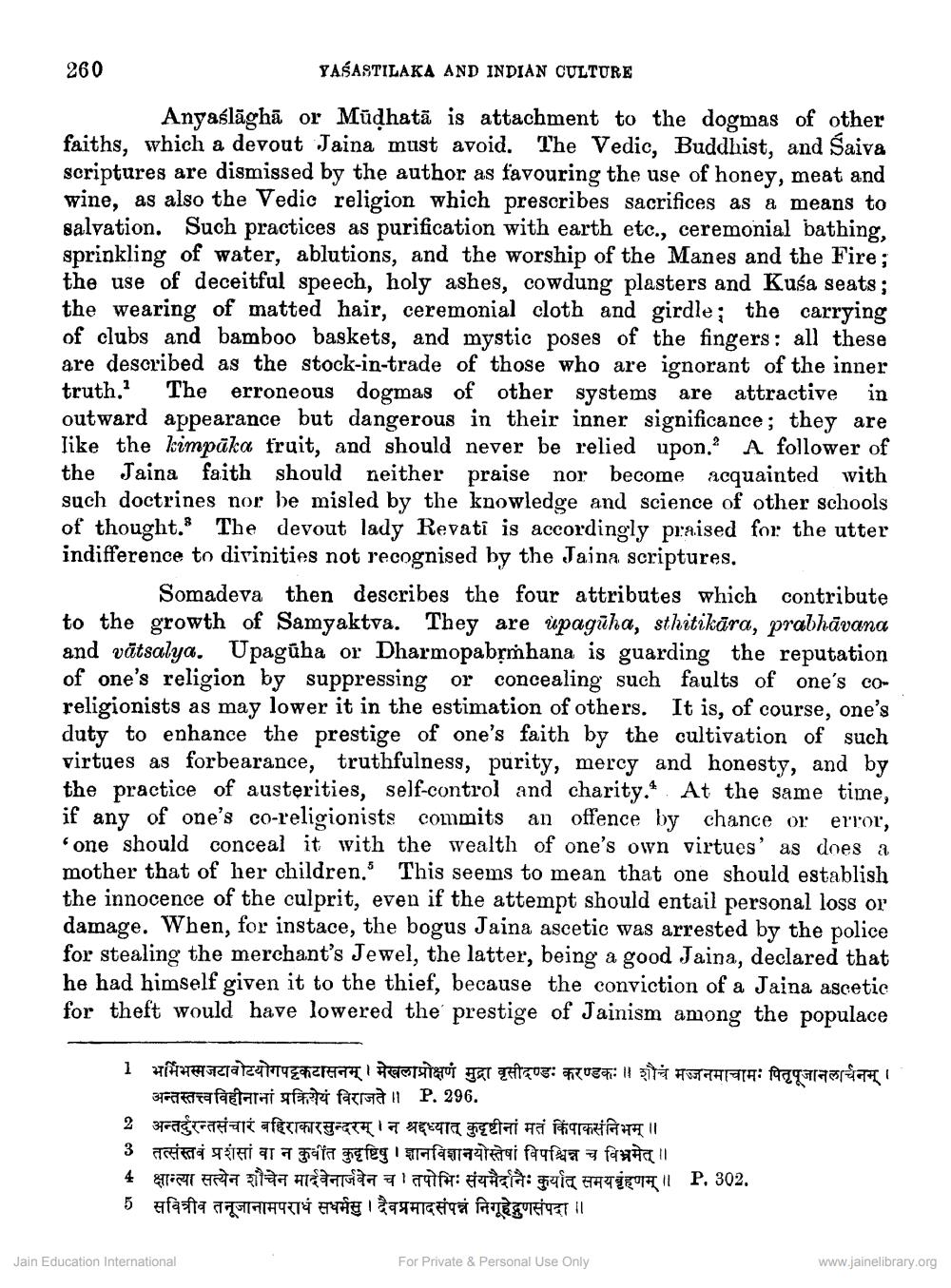________________
260
YASASTILAKA AND INDIAN CULTURE
Anyasläghā or Müdhatā is attachment to the dogmas of other faiths, which a devout Jaina must avoid. The Vedic, Buddhist, and Saiva scriptures are dismissed by the author as favouring the use of honey, meat and wine, as also the Vedic religion which prescribes sacrifices as a means to salvation. Such practices as purification with earth etc., ceremonial bathing, sprinkling of water, ablutions, and the worship of the Manes and the Fire; the use of deceitful speech, holy ashes, cowdung plasters and Kuśa seats; the wearing of matted hair, ceremonial cloth and girdle; the carrying of clubs and bamboo baskets, and mystic poses of the fingers: all these are described as the stock-in-trade of those who are ignorant of the inner truth. The erroneous dogmas of other systems are attractive in outward appearance but dangerous in their inner significance; they are like the limpāka fruit, and should never be relied upon. A follower of the Jaina faith should neither praise nor become acquainted with such doctrines nor be misled by the knowledge and science of other schools of thought. The devout lady Revati is accordingly praised for the utter indifference to divinities not recognised by the Jaina scriptures.
Somadeva then describes the four attributes which contribute to the growth of Samyaktva. They are upagūha, sthitikāra, prabhāvana and vätsalya. Upagūha or Dharmopabrṁhana is guarding the reputation of one's religion by suppressing or concealing such faults of one's coreligionists as may lower it in the estimation of others. It is, of course, one's duty to enhance the prestige of one's faith by the cultivation of such virtues as forbearance, truthfulness, purity, mercy and honesty, and by the practice of austerities, self-control and charity. At the same time, if any of one's co-religionists commits an offence by chance or error,
one should conceal it with the wealth of one's own virtues' as does a mother that of her children. This seems to mean that one should establish the innocence of the culprit, even if the attempt should entail personal loss or damage. When, for instace, the bogus Jaina ascetic was arrested by the police for stealing the merchant's Jewel, the latter, being a good Jaina, declared that he had himself given it to the thief, because the conviction of a Jaina ascetic for theft would have lowered the prestige of Jainism among the populace
1 भर्मिभस्मजटावोटयोगपट्टकटासनम् । मेखलाप्रोक्षणं मुद्रा वृसीदण्डः करण्डकः ॥ शौच मज्जनमाचामः पितृपूजानलार्चनम् ।
grafita fatrai sfertei fatisd P. 296. 2 अन्तर्दुरन्तसंचार बहिराकारसुन्दरम् । न श्रद्दध्यात् कुदृष्टीनां मतं किंपाकसंनिभम् ।। 3 तत्संस्तवं प्रशंसां वा न कुर्वीत कुदृष्टिषु । ज्ञानविज्ञानयोस्तेषां विपश्चिन्न च विभ्रमेत् ।। 4 hora ilga H arian 1974: 449la: guia CHTÍCH 11 P. 302. 5 सवित्रीव तनूजानामपराधं सधर्मसु । दैवप्रमादसंपन्नं निगृहेद्गुणसंपदा ।।
Jain Education International
For Private & Personal Use Only
www.jainelibrary.org




